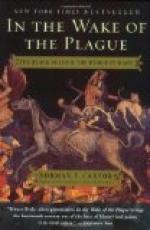That knew not his own purpose—The red sun
Rose early over incense of bright mist,
That girdled a pure sky of amethyst.
And who was he? A monk. And those who knew
Yclept him Julio; but they were few:
And others named him as a nameless one,—
A dark, sad-hearted being, who had none
But bitter feelings, and a cast of sadness,
That fed the wildest of all curses—madness!
But he was, what none
knew, of lordly line,
That fought in the far land
of Palestine,
Where, under banners of the
cross, they fell,
Smote by the armies of the
infidel.
And Julio was the last; alone,
alone!
A sad, unfriended orphan,
that had gone
Into the world, to murmur
and to die,
Like the cold breezes that
are passing by!
And few they were that bade
him to their board;
His fortunes now were over,
and the sword
Of his proud ancestry dishonour’d—left
To moulder in its sheath—a
hated gift!
Ay! it was so; and Julio had
fain
Have been a warrior; but his
very brain
Grew fever’d at the
sickly thought of death,
And to be stricken with a
want of breath!—
To be the food of worms—inanimate,
And cold as winter,—and
as desolate!
And then to waste away, and
be no more
Than the dark dust!—The
thought was like a sore
That gather’d in his
heart; and he would say,—
“A curse be on their
laurels!” and decay
Came over them; the deeds
that they had done
Had fallen with their fortunes;
and anon
Was Julio forgotten, and his
line—
No wonder for this frenzied
tale of mine!
Oh! he was wearied of this passing scene!
But loved not death: his purpose was between
Life and the grave; and it would vibrate there,
Like a wild bird that floated far and fair
Betwixt the sun and sea!
He
went, and came,
And thought, and slept, and
still awoke the same,—
A strange, strange youth;
and he would look all night
Upon the moon and stars, and
count the flight
Of the sea waves, and let
the evening wind
Play with his raven tresses,
or would bind
Grottoes of birch, wherein
to sit and sing:
And peasant girls would find
him sauntering,
To gaze upon their features,
as they met,
In laughter, under some green
arboret.
At last, he became monk, and,
on his knees,
Said holy prayers, and with
wild penances
Made sad atonement; and the
solemn whim,
That, like a shadow, loiter’d
over him,
Wore off, even like a shadow.
He was cursed
With none of the mad thoughts
that were at first
The poison of his quiet; but
he grew
To love the world and its
wild laughter too,
As he had known before; and
wish’d again
To join the very mirth he
hated then!




